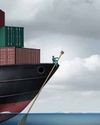Foreseeing the immense opportunity that the hinterland has on offer, way back in 2009, JSW Infrastructure had commissioned a port at Jaigarh, and now it has set sight onto become the leading port operator in India with a formidable presence in India and beyond tapping opportunities in port led development, connectivity and infrastructure sectors.

The western coast owing to its proximity to the Gulf of Aden has been at the forefront of port-led activities. While Gujarat with a coastline of 1,600 kms is dotted with multiple full-fledged operational ports, but its immediate neighboring state of Maharashtra on the contrary for long time relied heavily on ports off Mumbai coast and other states. With the state economy estimated to have grown at 9.4 per cent, and manufacturing and industry growth at 8.4 per cent and 6.7 per cent, respectively in 201617, Maharashtra needs some serious infrastructure upgradation to keep pace with the economic growth. Being the financial nerve centre of the country, and with a diversified economy consisting of agricultural, industrial, and EXIM trade, the state was in want of a modern, free-flowing and scalable port with enough draft to accommodate not only the existing ultra large cargo carriers but also be future ready to meet demands of trade growth. In later part of last decade a port with similar specification took shape at Jaigarh in Ratnagiri district. Located at around 131 nautical miles south of Mumbai and its choke a block population density, yet close enough to move cargo without any hindrance using single or multi-modal mode of transportation. Jaigarh’s proximity to Mormugao Port in Goa and the state of Karnataka gives it added advantage of extended hinterland and of course rest of Maharashtra and other neighboring states.
Denne historien er fra February 2018-utgaven av Maritime Gateway.
Start din 7-dagers gratis prøveperiode på Magzter GOLD for å få tilgang til tusenvis av utvalgte premiumhistorier og 9000+ magasiner og aviser.
Allerede abonnent ? Logg på
Denne historien er fra February 2018-utgaven av Maritime Gateway.
Start din 7-dagers gratis prøveperiode på Magzter GOLD for å få tilgang til tusenvis av utvalgte premiumhistorier og 9000+ magasiner og aviser.
Allerede abonnent? Logg på

Impact Of Covid-19 On Shipping And Logistics
Industry stalwarts discuss threadbare the prevailing logistics and supply chain scenario and issues in clearing cargo during the COVID-19 lockdown

Digital Platforms Defy Lockdown
Digital trading modules such as eNAM are enabling farmers to move their produce from farm to market even during the lockdown

GARMENT TRADE TRAMPLED
As retailers face a shutdown in US and Europe, the cascading affect has caused mass cancellation of orders in Bangladesh

TRADE RESUMES WITH CHINA
While India has allowed uninterrupted movement of imports into Nepal even during lockdown, China is reopening its borders as it emerges from the pandemic
LESS HUMAN INTENSIVE, MORE DATA DRIVEN
AI provides transformational opportunity for logistics industry by improving customer experience, operational efficiency, faster turnaround time and lower cost while ensuring security and transparency. Macro environment requires industry to transform to be less human intensive, agile and data driven, all of which can be accelerated by AI adoption, shares Gangadhar Gude, Founder & CEO, atai.ai

SHAKEN AND STIRRED
The COVID-19 pandemic has partially paralysed the logistics and supply chain, but the industry is still deterred to ensure supply of essentials continues

TRADE STUCK, ECONOMY SLOWS DOWN
Sri Lankan economy slows down as trade deficit widens and supply chain disrupts amidst lockdown

LENDING INTELLIGENCE TO SUPPLY CHAIN
If you’re shipping millions of dollars’ worth of pharmaceuticals, high-end electronics, expensive seafood, or precious metals, what would you be willing to pay for the ability to ‘ask’ your shipment where it is right now and whether it’s ok? What would you pay for a freight smart enough to raise an alarm before it spoils? Artificial Intelligence enables that and much more…

CONTAINER LINES SIGNAL ‘SOS'
As the per-unit cost of operations increases many lines are forced to blank sailings which has hit their bottom line real hard. The Government and Terminal Operators therefore need to actively consider reduction in Vessel Related Costs

IMO 2020 And The Covid-19 Curse
The COVID-19 outbreak has shaken and stirred the already volatile bunker market. While the refiners adjust their capacities and shipping lines choose their path to compliance, the market dynamics are yet to reach an equilibrium